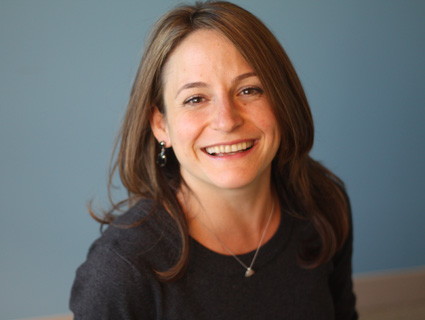We asked a range of authors and creative types to name books that bring solace or understanding in this age of rancor. More than two dozen responded. Here are picks from the delightfully evocative wordsmith Karen Russell, whose debut novel was a Pulitzer Prize finalist, and whose short-story collection, Vampires in the Lemon Grove, is weird and wonderful.

Latest book: Sleep Donation
Also known for: Swamplandia!
Reading recommendations: Cosmicomics, by Italo Calvino: Because, if everything we write and read becomes dire and reactionary, Trump will have truly won, here’s a book that celebrates the radical freedom of the imagination. A book brimming with recombinatory energy, play and joy. Light by which to see into many different futures.
Some Say, by Maureen McClane—or anything/everything by McClane, whose vitalizing series of “Dawn School” poems was written, she says, out of “a desire to resist apocalyptic anxiety without denying ‘reality.'”
Ill Nature: Rants and Reflections on Humanity and Other Animals, by Joy Williams: At a time when so many people are feeling impotent, consumed with helpless rage, Williams’ hilarious, furious, and stirring essays remind us rage can be helpful. It can be potent. Let’s put it to use, in the service of our fellow animals.
All Our Names, by Dinaw Mengestu: A book that brings down walls. Overlapping tales of American dislocation and American reinvention.
My last pick would be Late Victorian Holocausts, by Mike Davis. This groundbreaking “political ecology of famines” traces the development of today’s so-called “third world” to wealth inequalities that were shaped in the late 19th century, when non-European peasantries were violently yoked into the world economy. Dozens of examples of “malign interactions between climactic and economic processes” that have a grave resonance with the overlapping crises of our present moment. A challenge to the view of markets as self-regulating automata and an indictment of the human authors of “natural” disasters: “Millions die,” Davis writes, “was ultimately a policy choice.”
_______
The complete series: Daniel Alarcón, Kwame Alexander, Margaret Atwood, W. Kamau Bell, Ana Castillo, Jeff Chang, T Cooper, Michael Eric Dyson, Dave Eggers, Reza Farazmand, William Gibson, Mohsin Hamid, Piper Kerman, Phil Klay, Alex Kotlowitz, Bill McKibben, Rabbi Jack Moline, Siddhartha Mukherjee, Peggy Orenstein, Wendy C. Ortiz, Darryl Pinckney, Joe Romm, Karen Russell, George Saunders, Tracy K. Smith, Ayelet Waldman, Jesmyn Ward, and Gene Luen Yang.

















